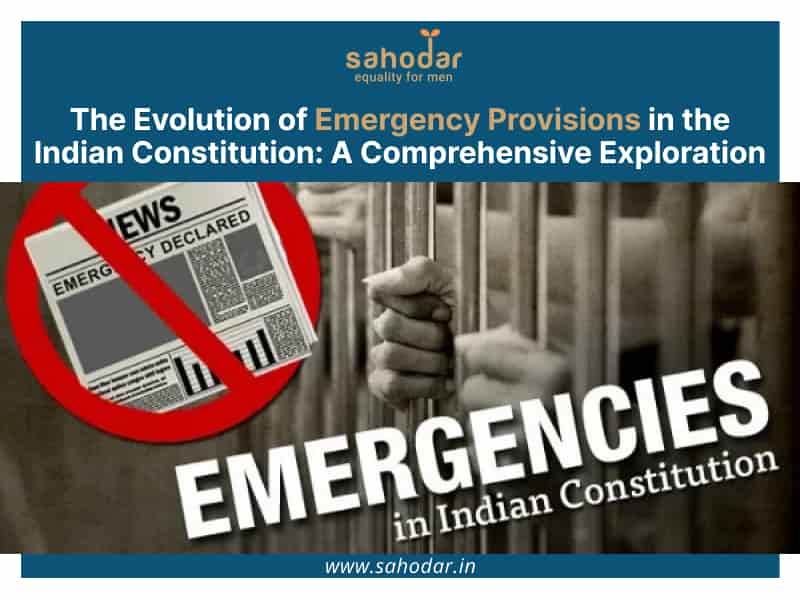In the tapestry of India’s constitutional framework, the Emergency Provisions stand as sentinel guards, entrusted with the formidable task of preserving the nation’s unity, integrity, and democratic ethos in times of turmoil. These provisions, enshrined within the Indian Constitution, bestow upon the government extraordinary powers to navigate through crises, yet their implementation has often sparked contentious debates, questioning the delicate balance between state authority and individual liberties.
This article embarks on a thorough journey through the historical evolution, legal intricacies, practical implications, and contemporary debates surrounding the Emergency Provisions in the Indian Constitution.
Historical Evolution of Emergency Provisions
The roots of Emergency Provisions in India delve deep into the tumultuous epoch of the independence struggle and the arduous endeavor of nation-building amidst the shards of Partition. As the Constituent Assembly grappled with the specter of communal tensions, external aggression, and internal strife, it deliberated fervently on mechanisms to fortify the nascent nation against existential threats. Drawing inspiration from a myriad of constitutional models across the globe, the framers sculpted a sophisticated framework that endowed the state with requisite powers to confront emergencies, while fervently upholding the principles of democracy and individual freedoms.
The incorporation of Emergency Provisions in the Indian Constitution was not merely a response to immediate exigencies but also a reflection of the framers’ foresight and pragmatism. The trauma of Partition, the specter of communal violence, and the lessons drawn from historical precedents, such as the British Emergency Powers Act of 1920, profoundly influenced the crafting of these provisions. Moreover, the principles espoused by luminaries like Jawaharlal Nehru, B.R. Ambedkar, and Sardar Patel played a pivotal role in shaping the contours of emergency governance in post-colonial India.
Emergency Provisions Legal Framework
The scaffolding of Emergency Provisions finds its anchorage in Articles 352, 356, and 360 of the Indian Constitution, delineating the contours of state authority during different exigencies. Article 352, often referred to as the “Emergency Article,” empowers the President to proclaim a national emergency in the face of war, external aggression, or armed rebellion, thereby vesting the central government with sweeping authority over various domains of governance. State emergency, governed by Article 356, authorizes the imposition of President’s Rule in states grappling with a breakdown of constitutional machinery, facilitating central intervention in state affairs. Financial emergency, as stipulated in Article 360, furnishes the center with the leeway to assume control over a state’s financial matters during times of economic distress.
The legal framework governing Emergency Provisions is not static but subject to evolution and interpretation through judicial pronouncements and legislative enactments. Over the years, the Supreme Court of India has played a seminal role in delineating the scope and limitations of executive authority during emergencies. Landmark cases like the Kesavananda Bharati case (1973), Minerva Mills Ltd. v. Union of India (1980), and S.R. Bommai v. Union of India (1994) have established judicial precedents safeguarding constitutional principles and fundamental rights, even in the face of emergencies.
Practical Implications and Debates
The invocation of Emergency Provisions, though imperative in times of political upheaval, has often ignited fiery debates and raised pertinent questions about the sanctity of democratic governance. The specter of the Emergency of 1975, orchestrated by then-Prime Minister Indira Gandhi, looms large in the annals of Indian history, marked by the suspension of fundamental rights, stifling of dissent, and widespread political repression. This dark chapter underscored the vulnerability of democratic institutions and the imperative of robust safeguards against executive overreach.
The Emergency of 1975 serves as a poignant reminder of the perils inherent in unchecked executive authority and the indispensability of institutional checks and balances. The excesses committed during this period, including arbitrary arrests, censorship, and erosion of civil liberties, evoked widespread condemnation and prompted introspection within the polity. Subsequent judicial interventions, notably the Kesavananda Bharati case, reaffirmed the judiciary’s pivotal role in upholding constitutional principles and curbing executive excesses.
Contemporary Debates
In contemporary times, debates surrounding Emergency Provisions encompass a plethora of issues ranging from federalism and civil liberties to national security imperatives. The recurrent imposition of President’s Rule in various states has ignited concerns about the dilution of federal principles and centralization of power. Instances of internet shutdowns, curfews, and mass detentions during protests or communal unrest have reignited discussions on striking a delicate balance between security exigencies and individual rights. Moreover, the emergence of new challenges such as cyber threats, terrorism, and transnational crimes has spurred calls for revisiting and reformulating the Emergency Provisions to align with contemporary realities.
The advent of globalization, technological advancements, and evolving security paradigms has necessitated a nuanced approach towards emergency governance. While the traditional notion of emergencies centered on military threats and internal rebellions, contemporary emergencies encompass a broad spectrum of challenges, including pandemics, cyber-attacks, and climate-induced disasters. As such, there is a growing recognition of the need for adaptive and responsive legal frameworks that can effectively address emergent threats while upholding democratic values and human rights.
Conclusion
The Emergency Provisions in the Indian Constitution epitomize the nation’s unwavering commitment to safeguard its democratic ideals and constitutional principles in times of crisis. While indispensable for maintaining national unity, integrity, and security, their invocation demands meticulous adherence to constitutional norms, judicial oversight, and accountability mechanisms. As India traverses through the complexities of the 21st century, a judicious and responsible approach towards the application of Emergency Provisions is indispensable to preserve the democratic ethos, federal structure, and pluralistic fabric of the nation. Through steadfast vigilance, institutional resilience, and an unyielding commitment to democratic values, India can navigate through emergent challenges while upholding the sanctity of its constitutional edifice.

